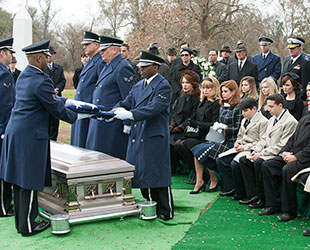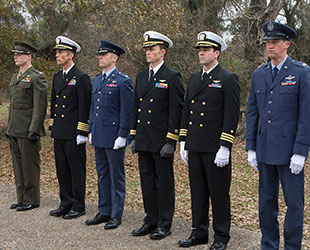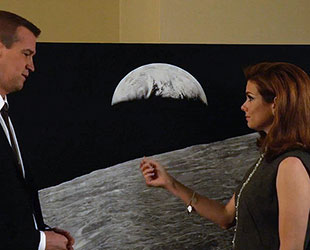 advertisements advertisements
|

|
'The Astronaut Wives Club': Space history vs. Hollywood in Episode 8 'Abort'

Apollo 1 commander Gus Grissom's funeral in "Abort," the eighth episode of ABC's docudrama "The Astronaut Wives Club." (ABC) |
Aug. 7, 2015 – The eighth episode of ABC's 10-part series "The Astronaut Wives Club" dove into the aftermath of the Apollo 1 accident.
On Jan. 27, 1967, astronauts Gus Grissom, Ed White and Roger Chaffee were tragically killed in a fire that broke out in their spacecraft during a routine test on the launch pad. Thursday's (Aug. 6) installment of "Astronaut Wives Club" primarily followed one of the wives in her attempt to come to terms with her husband's death.
"Betty Grissom faces the grim reality that her husband, Gus, is gone," ABC wrote in its synopsis for the episode. "With Gus having died while preparing for a mission, Betty must move forward planning his funeral and a life without him. After receiving word that Gus' death may have been preventable, Betty is determined to get answers in Gus' death and embarks on a battle for justice."
As readers who have been following these "space history vs. Hollywood reviews" know, "abort" is the label assigned to the "Astronaut Wives Club" scenes that divert from the events as they happened in real life.
This episode was aptly titled "Abort."

The six surviving Mercury astronauts attend Grissom's funeral in "The Astronaut Wives Club." From left to right: John Glenn, Alan Shepard, Gordo Cooper, Scott Carpenter, Wally Schirra and Deke Slayton (Sam Reid, Desmond Harrington, Bret Harrison, Wilson Bethel, Aaron McCusker and Kenneth Mitchell.) (ABC) |
Post-mission debriefing: Here's a look at where Episode 8 stayed true to space history ("A-OK!") and where it veered off course ("ABORT!").
"Better if it wasn't black" Imagining her Gus (Joel Johnstone) is still alive and preparing breakfast the morning of his funeral, Betty (portrayed by JoAnna Garcia Swisher) considers her dress choice.
A-OK! "You know I hate black," Gus – as imagined by Betty – says. The real Betty Grissom recounted the same thing to author Lily Koppel, whose book "The Astronaut Wives Club" served as the basis for the series.
Grissom's funeral was held on January 30, 1967 at Arlington National Cemetery outside of Washington, D.C. Betty (as correctly shown in the episode) wore a white-striped navy blue coat.
Underneath her coat, according to astronaut Scott Carpenter's memoirs "For Spacious Skies," was an orange bouclé suit. "The color of fire."
"Urelane 577-1." Betty is approached at the funeral by a man (Blake Lee) who only identifies himself as having worked with Gus. "There's something they're not telling you about your husband," he warns. The two later meet at a restaurant, where he tells her of a memo he wrote advising about the flammability of a foam used throughout the capsule.
ABORT! These scenes begin a series of problems with the episode.
The mysterious man is apparently based on John Dietz, an engineer who worked on the development of the Apollo command module and who just days prior to the fire drafted a memo warning about the combustible nature of the Urelane 577-1 foam used throughout the capsule.
That memo however, went unsent and wasn't even known about until Dietz came forward in 1971, four years after the fire, in support of Betty filing a $10 million lawsuit against North American Aviation, the prime contractor of the Apollo command module.
(The case was eventually settled for $350,000.)
That's not to say that NAA was not aware of Dietz's and NASA's concerns about flammable materials in the crew cabin. Dietz wrote his memo in support of an upcoming inspection of the spacecraft that had been scheduled for Jan. 31, just four days after the plugs out test that ultimately ended in tragedy.
The Apollo 204 Review Board, which investigated the causes of the accident, found "many types and classes of combustible material" had been installed in the capsule, including 34 square feet (3.2 square meters) of Velcro. (The board's final report did not cite Urelane specifically, but mentioned nylon and polyurethane foams.)
"They're not slowing down." Betty and Jo Schirra (Zoe Boyle) express repeated concerns that NASA is pushing forward on its schedule to launch to the moon instead of taking time to fix what went wrong.
ABORT! It wasn't the wives (or the astronauts) who had to remind NASA to "slow the hell down," as the episode depicted.
The fire took place on a Friday evening. Just three days later, flight director Gene Kranz addressed his team in Houston. "We were too gung ho about the schedule," said Kranz. "Not one of us stood up and said, 'Damnit, stop!"
Kranz then set the approach for mission managers and flight controllers going forward, demanding that Flight Control be forever "tough" and "competent."
"These words will remind you of the price paid by Grissom, White and Chaffee," he said.
"She's actually my aunt" Alice (Abbie Gayle) tries to befriend Ed White, Jr. (Matt Lanter) by sharing that her mother died when she was 5, and in doing so, reveals that her name was originally Judy.
A-OK! ...and ABORT! Alice Shepard was indeed the daughter of Louise's sister Adele, who died of flu-like symptoms in 1956. As Alice's father and her grandparents were unable to care for her and her two older siblings, Louise and Alan Shepard raised Alice with their two daughters.
The Shepards did change Judy's name to Alice to avoid any confusion with Julie, their daughter of the same age.
But it wasn't the secret the show presented it to be. Louise, in her 1961 LIFE article, described Alice as "our niece...who lives with us." And to this day, she goes by the name Alice.
"A diamond pin?" While helping Betty review her budget, Deke Slayton (Kenneth Mitchell) discovers a receipt for a $75 jewelry purchase. It turns out to be a diamond-studded version of the gold pin worn by the astronauts. Betty initially assumes it was for her.
ABORT! The story of this pin is well-documented.
Its purpose wasn't a mystery, as the episode made it out to be. The Apollo 1 crew (not Gus alone) had the special version of the gold astronaut pin made to honor Deke, who had earlier been grounded by a heart condition. The crew was going to take the pin on their mission and then present it to him.
The diamond was added because they knew Deke would refuse to wear a gold pin alone, as that was the symbol of astronauts who had flown in space.
"The wives... present[ed] that pin to me," recounted Slayton. "It was a gesture I'll never forget."
Slayton's pin would later be flown to the moon with the first astronauts to land there in 1969.
"Mom, please wake up!" Ed Jr. comes home and finds his grief-stricken mother unconscious.
A-OK! (Sadly.) Though it was a neighbor instead of her son that discovered Pat, Koppel describes the near-tragedy in similar detail in her book.
"Pat was found clutching a bottle of pills, which had to be wrestled from her hands."
(Tragically, this event foreshadows Pat's suicide in September 1983, after she was also diagnosed with cancer.)
"They're blaming Gus for the fire." Betty flies to Washington for the Congressional hearings into the fire. She arrives to hear testimony suggesting Gus "kicked a wire attached to the gas chromatograph," causing the fire.
ABORT! While it's true that an NAA engineer, John McCarthy, had hypothesized Grissom could have accidentally scuffed insulation on a wire in moving about the spacecraft, the 204 review board and the congressional committee rejected that notion.
Frank Borman, the first astronaut to enter the burnt-out capsule, testified that they "found no evidence to support the thesis that Gus, or any of the crew kicked the wire that ignited the flammables."
"Get them excited about the moon again" NASA holds a party for the sixth anniversary of Shepard becoming the first American to fly into space.
A-OK! ...and ABORT! NASA, in an effort to rebuild morale – both internally and externally – did in fact hold a party on May 6, 1967 to celebrate six years of Americans in space. The event also served as a fundraiser for the Ed White Memorial Scholarship Fund.
Shepard did take to the podium at that party and, in a speech similar to the one given by Deke on the show, said that "all of us here tonight jointly share the responsibilities" for the tragedy. But his parting words was not "slow the hell down," as depicted on the show, but rather, "Let's get on with the job."
Also, not to nitpick, but the episode's depiction of the party includes a display of the first-ever photo of the Earth rising over the moon, as was taken by NASA's Lunar Orbiter 1 robotic probe. That image was captured on Aug. 23, 1966, so it would have existed to be at the celebration, but the remarkably clear version of the photo that the show uses was not available until 2008.
The original version of the Lunar Orbiter "Earthrise" was grainy and dark. It was only through the efforts of the public-private Lunar Orbiter Image Recovery Project that the original data tapes were processed, producing the much better quality photograph.

A Lunar Orbiter 1 image serves as a backdrop for Deke Slayton (Kenneth Mitchell) and Betty Grissom (JoAnna Garcia Swisher) in the eighth episode of "The Astronaut Wives Club." (ABC) |
"Vladimir Komarov" Deke Slayton appears on TV to convey the country's sympathies on the death of a Russian cosmonaut "whose parachute failed to deploy upon re-entry."
ABORT! The show reports Komarov's tragic death after the party for Shepard, but in reality the Soyuz 1 mission commander died on April 24, 1967.
And it was a telegram, rather than a TV broadcast, that sent the condolences of the astronaut corps. NASA was ready to send two astronauts, Gordon Cooper and Frank Borman, to attend the funeral in the Soviet Union, but Russia responded that it was a private affair.
Update: A reader pointed out footage showing Deke Slayton delivering the condolences of the astronaut corps on TV, as depicted on the show. (so, A-OK!)
"A proper send-off." The wives wish Betty a bon voyage on her trip to Europe.
A-OK! After losing her husband in February 1966, Marilyn See took her three children and a niece on a trip to Mexico in April 1967. She followed that up six months later by touring Europe, inviting Betty Grissom to accompany her.
According to Koppel, the two visited Greece, Italy and Spain (but not France, as the show implied).
"The Astronaut Wives Club" collectSPACE reviews:
-
-
-
-
-
-
-
Episode 8 - "Abort" (Aug. 6) -
|

© 1999-2025 collectSPACE. All rights reserved.

|
|

|

|
